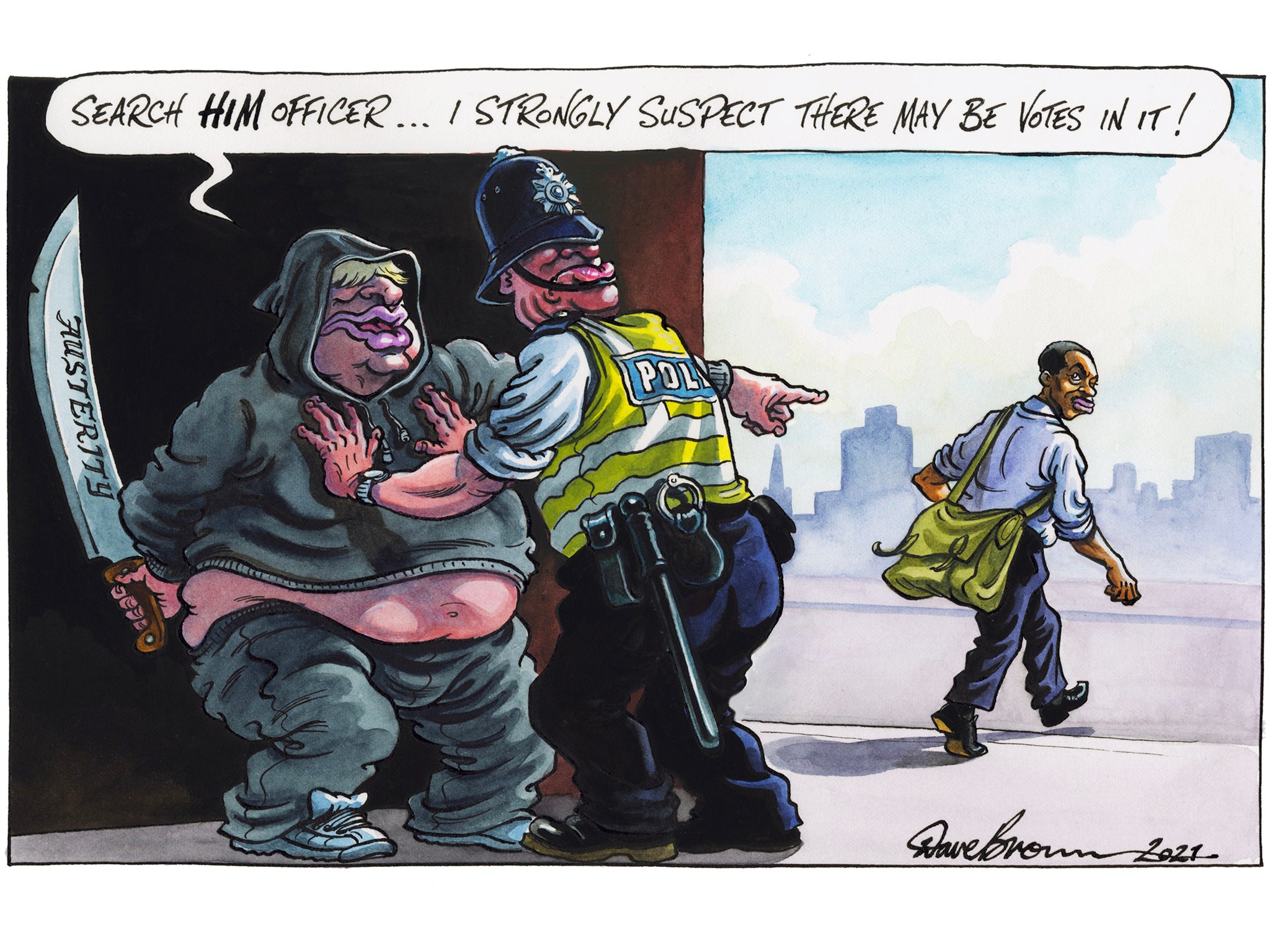Boris Johnson proposes to widen police powers to stop and search people on the street, removing the need to even demonstrate any “reasonable grounds” to question a free citizen as they go about their business.
Normally so jubilantly libertarian, the prime minister has, with all the constancy of the wobbly shopping trolley he’s so often compared to, veered off in an authoritarian direction again. Yesterday, he described stop and search as “kind and loving”, while calling for those guilty of antisocial behaviour to be “out there in one of those fluorescent-jacketed chain gangs visibly paying your debt to society”.
The prime minister is in a corner politically, with his party’s lead over Labour dropping, and Keir Starmer, a former director of public prosecutions, pursuing a Tony Blair-style “tough on crime, tough on the causes of crime” agenda. And so the metaphorical truncheon is drawn from Johnson’s belt, ready to start another culture war.
The question, though, is a simple one: does stop and search work? One way to find out, as the old saying goes, is to ask a policeman or policewoman. Mr Johnson appears not to have bothered with this and has gone ahead without consulting police chiefs. Indeed they are rightly annoyed that the first they knew about these new powers was when they learned of it from the media.
They are not universally enthusiastic about the plan. They know that resources are needed to tackle crime and, while the famous Conservative manifesto pledge to recruit 20,000 more officers is proceeding in a satisfactory direction, that only makes up (more or less) for the reduction in numbers during the austerity regime of his Conservative predecessors, David Cameron and Theresa May.
Resources for police work – ever more demanding but rewarding in the age of the digital footprint and advanced forensics – are not going to be forthcoming. Given that cracking the major drivers of modern crime involves surveillance, tracking and tracing drug gangs, white-collar criminals and online fraudsters, it is not immediately obvious how randomly stopping people on the street is going to dissuade criminals. Community policing is the best method of hammering down the knife crimes, thefts, antisocial behaviour and burglaries that distress the public so much.
There is also, at best, mixed statistical evidence of success, and much depressing history of the damage it does to relations between the police and people. A vanishingly small proportion of “stops” result in an arrest, and some 99 per cent of searches under section 60 do not recover a weapon.
Long experience also suggests that stop and search exacerbates racial tensions with grievous consequences. Widespread misuse of 19th-century “sus” laws in the 1970s victimised black youth and, piled atop other injustices, resulted in the unprecedented civil riots of the 1980s, now correctly seen in retrospect as an uprising against a hostile and aggressive state. The latest figures show that, across all stop and search powers, black people are nine times more likely to be stopped than white people, and the rate is even higher – 18 times – for section 60.
Since then successive home secretaries – even Theresa May – have discovered that policies that play well to an impatient audience at the Conservative Party conference fail. In due course they then relent, as Ms May did, until some successor comes along, in this case Priti Patel, and rediscovers the delights of this crude, counterproductive and un-British approach.
The game changer now is that body cameras worn by police, plus ubiquitous smartphones and CCTV, mean that any poor conduct on the part of the constabulary should be captured and thus deterred from happening in the first place. Abuse of power should be far less, at least. But the very randomness of the policy still means that it is an inefficient use of officers, and, justified or not, stop and search remains resented and a cause for mistrust and friction.
The existing requirement of “reasonable grounds” is a compromise between conflicting goals. By contrast, indiscriminate stop and search undermines the founding policing principle of consent. It is a bad idea as well as an old one.




Join our commenting forum
Join thought-provoking conversations, follow other Independent readers and see their replies
Comments